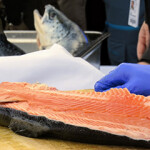Russia designing gear to reduce juvenile pollock bycatch

The Vladivostok Russia-based Pollock Catchers Association (PCA), and the Polar branch of the Russian Research Institute of Fisheries and Oceanography (PINRO), are developing a new sorting system for pelagic trawls that aims to significantly reduce the bycatch of juvenile pollock – an initiative inspired by World Wildlife Fund (WWF)-Russia, the latter organization said in a statement on its website.
Juvenile pollock can make up a significant part of the catch, which reduces the efficiency of fishing efforts while being detrimental to the pollock population.
Since 2002, pollock harvesting in the Russian Far East has been carried out using a pelagic trawl equipped with a special selective insert – which makes it possible to almost halve the by-catch of juvenile pollock. This insert reduced unwanted bycatch by 30 to 50 percent, Fishnews media agency reported.
However, with an increase in the volume of the catch, and the speed of trawling, its selective properties sharply decreased, so there is practically no release of live juveniles from the trawl, WWF-Russia claimed. Without modernization of fishing gear, it is getting more and more difficult to solve fishery’s existing problems.
That is why selective trawl today looks like the most effective solution to this problem. Scientists at PINRO are developing a design that can significantly improve both the selectivity of the net, and the survival of released juveniles.
“The solution to this problem is complex. It is necessary to take serious steps in the field of fishing regulation, to more clearly define the rights and obligations of observers on board, to establish a complete record of the catch,” WWF-Russia’s Senior Advisor to the Sustainable Marine Fisheries Program Konstantin Zgurovsky said. “On the one hand, this will allow to let juveniles away even before they get into the trawl, on the other – to make sure that everything that gets on board is processed. Unfortunately, the improvement of the monitoring system onboard vessels itself is not able to change the ratio of juvenile and mature pollock in the catch. Our ideas found support both in the PINRO and among the leadership of Russia’s Federal Agency for Fisheries."
The improvement of the selective properties of a trawl will reduce the pressure on juveniles, which means a positive impact on the stock, Alexey Buglak, president of PCA told Fishnews. PCA’s members adhere to the principles of sustainable fishing.
“That’s why it was decided to finance the design of possible technical solutions which would secure both stocks of pollock and the effectiveness of harvesting,” he said.
Photo courtesy of Maximillian cabinet/Shutterstock






Share